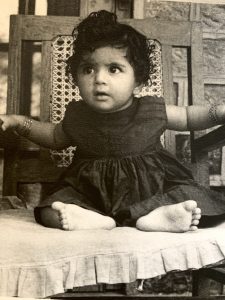by Sapna Batish
Reston, VA
When I was 1, my father inspected my baby bottle, about as old as me and surely past its prime. Deciding that a replacement was overdue, he flung it down the mountainside. (We lived near Shimla, India, in the foothills of the Himalayas.) The story goes that I refused the new bottle and went on a hunger strike, shedding so much weight my parents feared they’d lose me. I came around, but not before alerting everyone to my fierce spirit.

When I was 7, my parents decided to move our family to America. Beforehand, my parents hired a private tutor, who instructed me in a back room of our house. There, over several months, he molested me. When my mother caught him, he was fired, and the incident was never spoken of again. His words “What we did was very bad” were the last on the matter. Those lessons and the years of unbroken silence that followed snuffed the light from my eyes, broke my spirit and filled me with shame.
It didn’t derail me at the time, however. We moved to Ohio, where I threw myself into my studies, discovering by high school a love for history and literature, only to find that these discoveries about who I was were not to be spoken of. When my father heard that I favored the humanities over the sciences, he sat me down and grilled me for hours. What could I possibly want if not to become a doctor? he wanted to know. For him, becoming anything else would be throwing my life away.
These interrogations eventually broke me down. After high school, I entered an accelerated two-year undergrad program and then a single year of medical school, after which, to my father’s horror and my own intense shame, I dropped out and spiraled into a deep depression. On top of this, the trauma of the sexual abuse began to surface in my intimate relationships, which followed a devastating pattern, into my 40s, of intense attraction followed by crippling shame and suicidal insecurity.
In 1998, when I was 32, my psychologist, after watching me struggle for years despite therapy and medication, suggested I try chanting. “I don’t know what else I can do for you. I have a friend who chants. She says it helps.” The first time I chanted Nam-myoho-renge-kyo, I did feel lighter. But my first district meeting, in February 1998, clinched it. Each person shared how this Buddhism had helped them overcome the most painful experiences. I continued to take antidepressants and see a therapist, but it was the chanting that set my life on a new trajectory.
I had a long way to go. I remember the first time I read Nichiren Daishonin’s words “Buddhist teachings will not relieve you of the sufferings of birth and death in the least unless you perceive the true nature of your life” (“On Attaining Buddhahood in This Lifetime,” The Writings of Nichiren Daishonin, vol. 1, p. 3). In my state, I thought this meant that the necessary first step on the path to enlightenment was to recognize how worthless I currently was.
My startled district leader explained over coffee that this is not the Daishonin’s point. With a finger, she navigated back one sentence, quickly clarifying what Nichiren was saying: My life itself, just as it is, is a Buddha.
I went back to the drawing board, affirming for myself that I did not have to become a doctor or be in a relationship to be worthy of respect. I received my doctorate in environmental science in 2006 and met my husband, with whom I haven’t once felt insecure, in 2010. I was happier but my despair continued to surface because I still hadn’t overcome my biggest obstacle.
For 18 years, though I’d shared Buddhism with many people, and helped support my district in various capacities, I battled what I call “my monster;” an inner voice whose sole aim seemed to be to sabotage my daily practice. At times it was resentful: “Sapna, why should you have to chant simply to function?” At other times, it was cajoling: “You’re doing fine. You can skip morning gongyo today.” And then I’d skip it in the evening, too; then a week’s worth of gongyos; and this could turn into months. Slowly I would shrink from the world, stop answering phone calls, hardly leave the house, watching television, feeling utterly depleted, too ashamed to reach out to anyone.
That’s why it came as such a surprise when my chapter women’s leaders visited me in 2017 and asked me to take on district leadership. As the district women’s leader, I knew I’d have to be rock-solid. Did they know who they were talking to? I explained I hadn’t done gongyo that morning. “We know you have the capacity,” they said.
Taking care of the members of my district meant I had to take care of myself.”
Though terrified of accepting this responsibility, I knew I had to if I wanted to change my life. This is when I finally developed a consistent practice. Taking care of the members of my district meant I had to take care of myself. It’s also when I began to understand that hitting an obstacle wasn’t a time to back down, but a time to break through with determined prayer to turn karma into mission. I began chanting to be the best daughter I could be and found I was able to let go of my anger toward my father.

Today, I’m deeply gratified in my marriage and enjoy the conviction that I deserve my happiness. I’m finishing my first novel, a work of historic fiction, and am determined to help fight climate change in a way unique to me. This Buddhist practice is not about trying to forgive my past or make the best of an unfortunate situation, but about using sufferings to fuel my human revolution and lending this example to others battling to transform their lives. The resolve to light the way for others has allowed me to tap my own inner fire, inextinguishable and burning now more fiercely than ever.
You are reading {{ meterCount }} of {{ meterMax }} free premium articles

